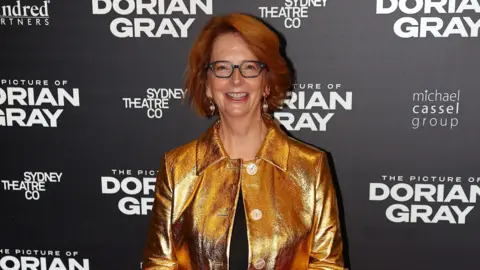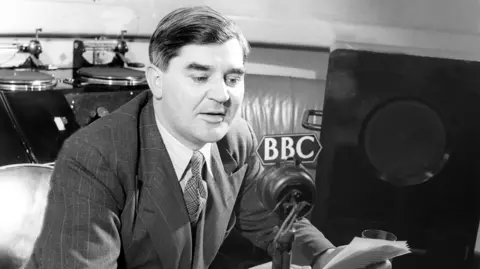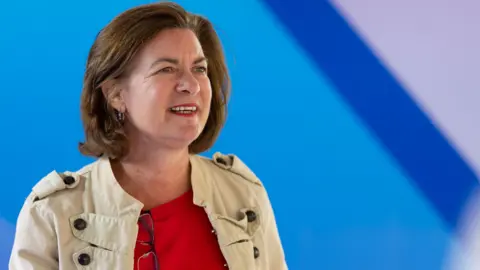Former Australian PM says Welsh roots shaped her
 Getty Images
Getty ImagesFormer Australian Prime Minister Julia Gillard has said her strong sense of Welsh heritage helped shaped her view of politics.
Gillard was born in Barry, Vale of Glamorgan, and was only four years old when her family emigrated to Australia.
The 63-year-old, who was the Australian Labor Party prime minister from 2010-2013 said figures such as Anuerin Bevan were "idolised" in her home and her parents instilled in her the idea that politics can affect real change.
Ms Gillard recently sat down with Wales' First Minister Eluned Morgan who, like her, was the first female leader of her country.
Neither of her parents spoke Welsh "apart from the occasional swear word", but had a "very strong sense of their Welsh identity," Gillard said.
''We always had this sense that our lives were formed in Australia, but we knew we had this heritage," she added.
Gillard recalled that her father was particularly interested in politics and news from his hometown and he had a great impact on her career.
''He gave me the sense that politics really mattered and that it could change people's lives," she added.
She remembered understanding even as a child the impact a "transformative figure" like Aneurin Bevan could have on people.
He could "make people's lives better" and "I was obviously attracted by that", she said.
''But it was a long time before the penny dropped that I was the kind of person that could go into politics," she added.

She recently reflected on this in an interview for her podcast with Morgan, Wales' first minister.
''We got to talk about life, the universe and everything, including being from Barry,'' she told BBC Walescast.
She said that during her time in office she experienced many incidents of sexism and misogyny.
''I had expected a wave [of sexism] around me being the first female leader.
''I assumed, though, that that wave would break, that it would become normalised... and it would go back to politics as usual.
''So, I was taken aback by the fact that it never broke. If anything, the amplitude of the wave just got higher and higher.''
It was not until a speech she made in October 2012, that she felt able to lay out her experiences of sexism as a female politician.
The speech, which called out the leader of the opposition for sexist comments about the prime minister, was shared around the world and seen by millions of people.
But Gillard said she regretted not speaking out sooner and would advise any female leader today to "call it out" immediately.
She believes it is important for people in a position of power to share their own experiences of prejudice.
"Unless we call things out, unless we shine a light on them, human behaviour doesn't change," she said.
Gillard said things have changed for a better in a lot of ways when it comes to gender equality, but social media has created a "toxic sewer for women".
''I think we have been having a far more robust and open debate about gender equality, particularly about sexual harassment," she said.
 Getty Images
Getty ImagesShe backed social media regulation as one way of helping to deal with this problem.
Australia is set to ban children under 16 from using social media this year after its parliament approved the world's strictest laws.
Gillard said social media could also have "huge benefits" but she was "extremely pro-regulation".
"In the face of something that is mixed, good and bad, we regulate to try and get the bad out of the system."
